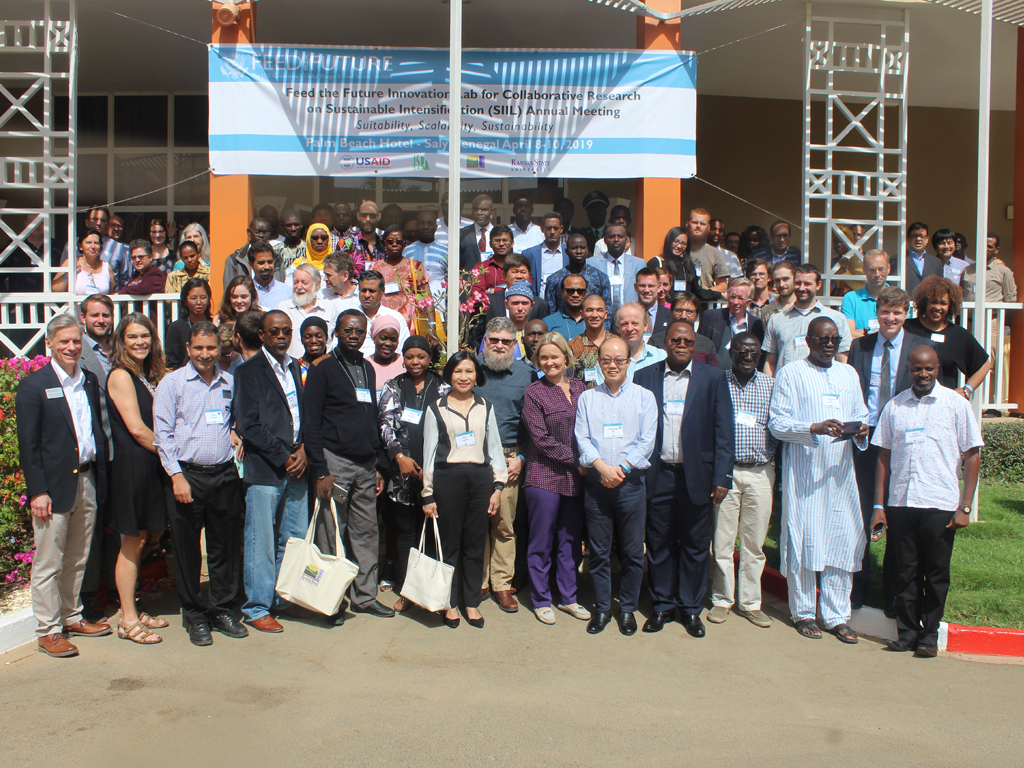
The staff of Kansas State University's Feed the Future Innovation Lab for Sustainable Intensification (SIIL).
Feed the Future Innovation Lab for Sustainable Intensification extended for five years
USAID adds $23 million to lab based at Kansas State University
Dec. 3, 2019
MANHATTAN, Kan. — A unique organization focused on farm innovations in developing countries and Kansas will continue and expand its work for another five years.
“We’re furthering our partnership with Kansas State University on the Feed the Future Innovation Lab for Sustainable Intensification for five years, building on our successful collaboration with them to date,” said Bonnie Glick, deputy administrator of the United States Agency for International Development at a reception for members of Congress earlier this fall.
The lab, called SIIL for short, was awarded to K-State in 2014 by USAID, with an initial budget ceiling of $50 million. After an extensive review, USAID extended funding with an additional budget of $23 million for the next five years (2019 to 2024) and an opportunity for growth as needed. K-State is home to three other Feed the Future Innovation Labs, which are:
- The Feed the Future Innovation Lab for Sorghum and Millet, known as SMIL.
- The Feed the Future Innovation Lab for the Reduction of Post-Harvest Loss, known as PHL.
- The Feed the Future Innovation Lab for Applied Wheat Genomics.
Each of those labs was extended last year; all three started a year earlier than SIIL.
“K-State’s Feed the Future Innovation Labs are a true asset in fulfilling the university’s land-grant mission so we’re pleased the Innovation Lab for Sustainable Intensification has received renewed funding,” said Richard Myers, K-State president. “The research produced by SIIL and the university’s other Feed the Future labs is not only helping producers in the foreign countries they serve but in Kansas as well. This work truly showcases K-State's leadership in global food systems.”
The term sustainable intensification refers to processes or systems designed to increase agricultural yields without adversely affecting the environment or converting additional non-agricultural land. “Sustainable intensification is required to meet the demands of a growing population and also addressing global food and nutritional security,” said Vara Prasad, K-State University Distinguished Professor and director of SIIL.
The concept and principles of sustainable intensification are especially important in areas with limited resources. The work of innovation labs fits well with K-State’s land-grant mission by making education and innovations available to everyone through research, teaching and outreach.
Likewise, sustainable intensification is crucial to USAID’s mission to promote self-reliance and resilience for farmers around the world while enhancing U.S. security and prosperity.
In the first five years, SIIL’s work included research projects in Bangladesh, Burkina Faso, Cambodia, Ethiopia, Malawi, Senegal and Tanzania, working toward common themes of increasing sustainable agriculture productivity, enhancing resilience of cropping systems and supporting nutritional outcomes.
In total, SIIL works with more than 67 host-country organizations, research institutes and private-sector partners; eight international research centers; and 13 U.S. universities.
Also in the first five years, SIIL supported more than 120 scientists, trained more than 80 graduate students and provided short-term training to more than 15,000 farmers and agricultural professionals across the globe.
That work is done by identifying and validating farm technologies that are designed to increase productivity of crops and livestock, improve natural resource management, enhance resilience to abiotic and biotic stresses, and help create conditions that allow for adoption of these practices to improve human well-being and livelihoods.
“While our work in the Innovation Labs has a global impact, the knowledge we gain in sustainable intensification has direct benefits to Kansas producers,” said Ernie Minton, dean of the College of Agriculture and director of K-State Research and Extension. “For example, K-State researchers and extension specialists conduct research and assist farmers to implement modern irrigation technology to improve water conservation at Water Technology Farms throughout the Ogallala-High Plains aquifer. This work is key to safeguarding future water resources for Kansas.”
SIIL’s first phase focused on developing innovations and tools that are useful for our stakeholders including producers, researchers, and policy makers, Prasad said. Showing benefits, return on investment and identifying pathways to scale will be the focus of the next five years.
He likened the initial phase to building a house, but not yet living in it. USAID had many options for “moving into” that house and chose to give SIIL the maximum number of years and maximum budget available to continue its work.
“The next phase will open opportunities for new thoughts, people, and organizations,” Prasad said. “We have learned a lot of things. We did a lot of good things and will continue to improve in the future to make a difference in the livelihoods of people. This is our chance to revisit and focus on our continued progress and fill missing research gaps and build social capital.”
To learn more, visit the SIIL website and follow the lab on social media:
- Twitter: @SIIL_KSU
- Facebook: /SIILKSU
- Instagram: @SIIL_KSU

